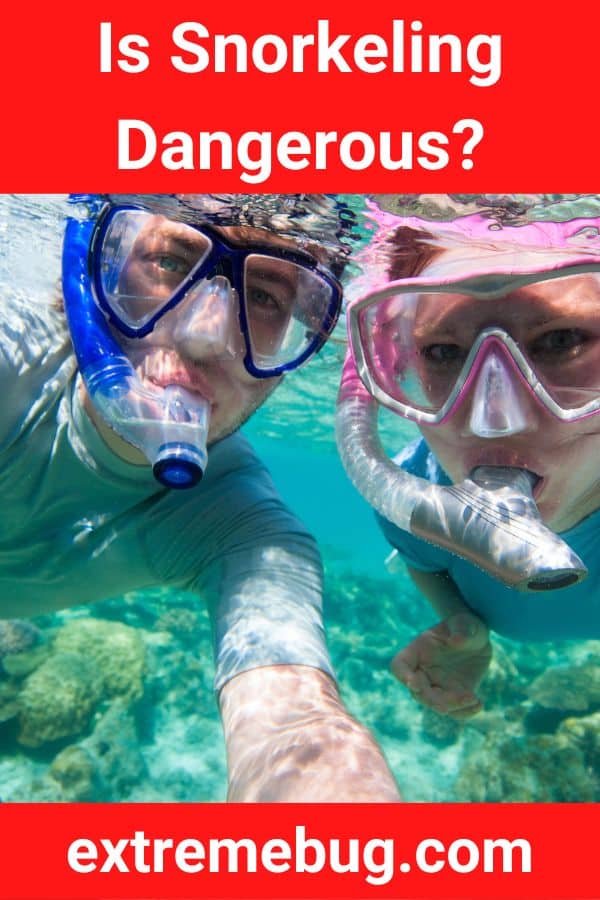Snorkeling may be viewed by most of us, rightly so, as a leisure activity—a great thing to do on holiday and see all sorts of animals you might never otherwise be able to see up close.
But there are equally valid concerns about the safety of snorkeling.
That being said, is snorkeling dangerous or is it safe?
Snorkeling is largely safe, although there are obviously risks involved. You need to be a strong swimmer, and you shouldn’t do it without professional supervision. You need to be aware of all the dangers from things like currents, any health risks, and of course marine life and underwater objects.
So, while there are of course dangers involved with snorkeling, it is by and large quite safe.
It really depends a lot on you—if you just wade out into the sea with your snorkel, somewhere you aren’t familiar with without much training, you’re at very serious risk.
But if you play by the rules, snorkeling is usually quite safe.
Let’s find out more.
Is it safe to go snorkeling?
Yes, it is, as long as you do so with safety in mind.
You typically have to get a reasonable distance from the shore to see anything while snorkeling, and that obviously comes with its own dangers and risks.
There are strong currents, sea creatures you might not be aware of, and you may just be unaware of local geography.
So, if your plan is to just don your snorkel and head out onto a coral reef or some other place just off the shoreline, on your own or just with your friends, then that is extremely dangerous and presents countless risks.
For the most part, though, snorkeling can be mostly safe as long as you take steps to make sure you practice it safely.
Firstly, and most importantly, the only advice you should really need is to only snorkel through a snorkeling company and with professionals around to help you and guide you.
If you’ve never snorkelled before, then there are many things you won’t think about before heading into the water.
Snorkeling with professionals with you puts the risks close to zero, as long as the company is reputable.
You’ll have a boat or other safety measure nearby if you need to get out of the water, you’ll be guided on where to go and how to use your snorkel, and you’ll be instructed on which animals to avoid.
So, snorkeling is perfectly safe, as long as you do it responsibly.
Of course, there are always dangers involved, and it’s never risk-free, but the risk is very low in the right circumstances.
Is snorkeling safe for non-swimmers?
It depends, but you may be surprised to hear that there are certain contexts where non-swimmers, with the right instruction, can snorkel safely.
By and large, though, you do really need to be a reasonably strong swimmer in order to be able to snorkel, especially in any kind of deep water.
Non-swimmers can be instructed on how to float on top of the water in shallow waters by snorkeling instructors so that they can snorkel safely while still being a non-swimmer.
If you do have your heart set on any kind of deeper snorkeling, then my advice would be to try and shore up your swimming skills.
Without any ability to swim, being in the water can be a very nerve-wracking experience, and it’s often hard to focus on the actual snorkeling.
So, while shallow snorkeling can be safe for non-swimmers, I would always advise practising swimming to some extent before you go.
Many snorkeling operations simply won’t take you if you can’t swim at all, for safety reasons.
So, what actually causes deaths during snorkeling?
What causes death while snorkeling?
Unsurprisingly, data shows that the most common cause of death in snorkeling is drowning in one form or another.
You may be surprised to learn that drowning does not actually have to involve inhaling water.
I mentioned the danger of health risks when snorkeling, and the biggest dangers are to do with heart problems.
The leading cause of death in snorkeling is what’s called rapid onset pulmonary edema, which is a lot like having a heart attack.
Snorkelers suffer heart-related problems during snorkeling and drown before they are able to be saved.
Other causes of death include being swept out to sea by a strong and unexpected current, marine wildlife injuries, and lacking strong enough swimming ability.
Is snorkeling harder than diving?
No, is the short answer.
Snorkeling is a lot easier than full-on scuba diving, as you don’t have to dive down but can mostly just float on the surface of the water.
This means it involves a good deal less physical exertion than diving.
But that’s not to suggest snorkeling is easy.
It can be very difficult to get the hang of breathing through your mask and being able to carry yourself calmly through the water.
Again, this is why I would always suggest doing it through a company before you try it solo.
Maybe one day you can take it further and try scuba diving!
Snorkeling presents a lot of potential dangers if you aren’t careful of everything that might go wrong, then.
You could be swept out to sea, you could suffer a health issue during snorkeling, or you could just be injured by a large rock sea creature.
Always snorkel with professionals around, they will keep you safe as well as providing the best snorkeling experience.







